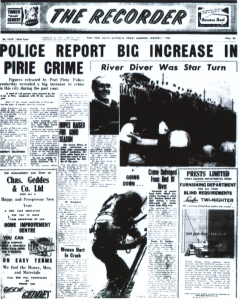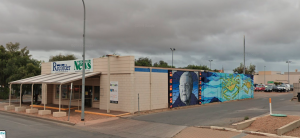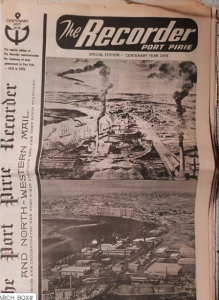The people of Port Pirie, a town famous for its giant lead smelter, all miss something about their local paper, The Recorder, which closed its doors in April this year.
Many read the weekly newspaper back to front, to catch up on local sport and the ‘Births, Deaths and Marriages’ pages first – essential reading by all accounts.
It kept The Recorder’s 5000-strong readership connected to their community of around 14,000 people.

The Recorder office on Mary Elie Street, Port Pirie. (DYLAN SMITH)
Dylan Smith, who grew up in the town and later started his journalism career at the paper, said The Recorder played a huge role in his life.
“Growing up in Port Pirie I always remember reading The Recorder every week, it would always be on the kitchen table,” Smith said.
“The stories I was telling were far more personal to me because I could make a connection most of the time, to the people I was writing about.”
Smith was one of four country news editors made redundant by Australian Community Media (ACM) in December 2019, following former Fairfax Media executive Antony Catalano’s purchase of ACM in April 2019.
Many feared this would impact the paper’s ability to maintain its local focus.
The Recorder is one of more than 150 newsrooms across Australia to have closed their doors since January 2019.
Port Pirie’s only local paper closed in mid-March and in a short announcement on its website said it was due to “concerns surrounding the spread of the coronavirus in the community”.
ACM declined to comment on The Recorder’s closure.
The Recorder office is on Mary Elie Street, smack bang in the middle of the town just off Main Road and next to towering, white grain silos, another symbol of Port Pirie’s economy.

Des Parker OAM with his camera during his time as The Recorder photographer. (DES PARKER)
On the side of the building, there is a mural dedicated to veteran of the newspaper and man about town Des Parker OAM.
“It’s so important for country people,” he said. “Things are on television and all that, and computers, but they’re not the write-ups – a lot of old people haven’t got computers and things like that.”
“They need their local paper,” Parker said.
Parker, 88, who was The Recorder’s photographer for 30 years, now spends most of his time in his shed with his photographs.
From paperboy when he was eleven years old, to platemaker, to photographer in 1980 and then with his own column ‘Nosey Parker’ in 1990, Des Parker is entwined with The Recorder’s history.
Parker said when he first started at The Recorder office in 1962, the paper was delivered to every street in the town, after he’d hand-rolled newspapers from 12am-4am.
“You learn more in a country town, the general view of a country newspaper,” he said.
“How in hell would we have the records of the stories, the former history without newspapers?”

The Recorder front page, January 1960. (PORT PIRIE LIBRARY)
Despite the sadness in the community about the loss of the newspaper, some locals believed The Recorder’s problems ran deeper than COVID-19.
Bev Argent, 77, lived in Port Pirie her whole life and prepared softball reports for the newspaper.
She pointed to the ownership changes.
“I’ve found since the paper has been taken over again, it became less local content and more generalised things that didn’t have relevance to the community,” Ms Argent said.
“I don’t particularly want to hear what the barley prices might be and the inference that has if we don’t send it to China, I want to hear about the man on the land who is hoping he’ll get a good season.”
Smith, former editor of the newspaper for nearly 12 years, said Port Pirie’s elderly population would be impacted by its closure.

Port Pirie smelter, 1932. (STATE LIBRARY OF SOUTH AUSTRALIA)
“Port Pirie has quite a large elderly population, so there’d be a lot of people who feel isolated right now, who would turn to the paper as a source of wanting to be lifted up, to feel positive, in a time where it’s a bit more doom and gloom,” he said.
Ms Argent admits the paper’s importance to the town went beyond journalism.
“I was looking today and found out that a person I knew had passed away, and I know COVID has made this extremely difficult, but the old births, deaths and marriages classifieds were what people relied upon so that they could share the grief and the journey of the people in the community,” she said.
“It’s very embarrassing when all of a sudden you run into someone [and say] ‘Oh, hi, how’s Mary?’, ‘Oh, she died two months ago.'”
But some go further in their criticisms.
Jonathan Brooks, a former journalist from Port Pirie, said the past 10 years had been “quite painful to witness”, claiming the paper had gotten “thinner and its news less relevant”.
“However, this does not diminish the tragedy of the paper closing,” Brooks said.
“Port Pirie now has nothing to record its history in the way that only a newspaper and qualified journalists can.

Mural of Des Parker OAM on the side of The Recorder building. (GOOGLE MAPS)
“In that regard, The Recorder to me means history.”
Around town, there was frustration about a lack of communication over the paper’s future.
The town’s Mayor Leon Stephens, who managed the paper about 30 years ago, said he had been told The Recorder was set to return as a physical newspaper after June.
But there would not be an office in the town, Cr Stephens said.
“I would definitely be very pissed if it didn’t go ahead,” he said.

The Recorder centenary edition. (JASON LOCKETT)
Smith said there had not been a “whole heap” of transparency from ACM about what would happen to the newspaper, which fuelled angst in the community.
“I think people just want to know, they want to hear directly from the company about what’s going on and what their plan is,” Smith said.
“Without sounding too sappy, in a way it did break my heart a little bit to see it sort of crumble away,” he said.
“The paper’s been published since 1898, it’s withstood two world wars and other pandemics or epidemics – to see it fade away now is sad to see.
“I do hope it comes back in its full print form.”
(Featured Image: Front page of The Recorder 1980, provided by Port Pirie Library).

